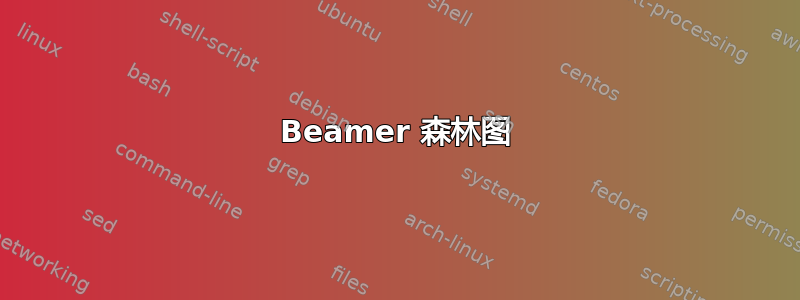
当我在我的旧笔记本电脑上运行下面的代码(请参阅本文末尾)时,我得到了以下正确的幻灯片输出:

我是否需要更改任何内容以与最新安装兼容?任何帮助都非常感谢。代码如下:
\begin{frame}[fragile]{Introduction to Decision Trees}{Decision Trees}
\scriptsize
We can represent decision problems in a graphical form as {\color{red} \textbf{Decision Trees}}\\[1mm]
For our hotel situation we have:\\[5mm]
\definecolor{dgreen}{RGB}{0,102,51}
\begin{center}
\scalebox{0.75}{
\put(17,210){{\color{blue}\textbf{Land purchase decision}}}
\put(120,210){{\color{blue}\textbf{Airport location}}}
\put(200,210){{\color{blue}\textbf{Payoff}}}
\put(7,186){Buy A}
\put(7,131){Buy B}
\put(7,76){Buy A \& B}
\put(7,21){Buy nothing}
\put(10,175){-18}
\put(10,120){-12}
\put(10,65){-30}
\put(10,10){0}
\put(109,197.5){A}
\put(109,170){B}
\put(109,143){A}
\put(109,115.5){B}
\put(109,88){A}
\put(109,61){B}
\put(109,33){A}
\put(109,6.5){B}
\put(109,189.5){31}
\put(109.5,161){6}
\put(109.5,135){4}
\put(109,107.5){23}
\put(109,80){35}
\put(109,53){29}
\put(109.5,26){0}
\put(109.5,0){0}
\begin{forest}
my label/.style={
edge label={node[auto, sloped,pos=.15,anchor=south]{#1}}
},
for tree={grow=0, child anchor=west, anchor=west, text ragged,
inner sep=1mm, edge={line width=0.65pt, draw=blue!50}, l sep+=27mm,
s sep+=5mm, if n children=0{before typesetting nodes={label/.wrap pgfmath arg={right:#1}{content()},
content={},
leaf-chance,
},
}{},
edge path={
\noexpand\path [draw, \forestoption{edge}] (!u.parent anchor) |- (.child anchor)\forestoption{edge label};
% alternatively, with angled lines
%\noexpand\path[\forestoption{edge}]
% (!u.parent anchor) -- ([xshift=-2.6cm].child anchor) --
% (.child anchor)\forestoption{edge label};
},
}
[, decision
[,chance, [{\color{dgreen}\textbf{0}}][{\color{dgreen}\textbf{0}}]]
[,chance, [{\color{dgreen}\textbf{-1}}][{\color{dgreen}\textbf{5}}]]
[,chance, [{\color{dgreen}\textbf{11}}][{\color{dgreen}\textbf{-8}}]]
[,chance, [{\color{dgreen}\textbf{-12}}][{\color{dgreen}\textbf{13}}]]
]
]
\end{forest}
}
\end{center}
\vspace{3mm}
\begin{tikzpicture}
\put(50,3) { \node [rectangle, minimum height=8pt, minimum width=8pt, draw=black, fill=black!30!white, thin, inner sep=0pt] at (70,10) {};}
\put(120,3) { \node [circle, minimum height=8pt, minimum width=8pt, draw=black, fill=black!30!white, thin, inner sep=0pt] at (70,10) {};}
\put(190,3) { \node [isosceles triangle, minimum width=10pt, draw=black, thin, fill=white, inner sep=0pt, shape border rotate=180, outer sep=-\pgflinewidth] at (70,10) {};}
\end{tikzpicture}
\put(55,5) {Decision Nodes}
\put(125,5) {Event Nodes}
\put(195,5) {Terminal Nodes}
\end{frame}
前言
\documentclass[fleqn,9pt]{beamer}
\usetheme[
%%% options passed to the outer theme
% hidetitle, % hide the (short) title in the sidebar
% hideauthor, % hide the (short) author in the sidebar
% hideinstitute, % hide the (short) institute in the bottom of the sidebar
% shownavsym, % show the navigation symbols
% width=2cm, % width of the sidebar (default is 2 cm)
% hideothersubsections,% hide all subsections but the subsections in the current section
% hideallsubsections, % hide all subsections
% left % right of left position of sidebar (default is right)
]{Aalborg}
\usepackage[utf8]{inputenc}
\usepackage{multicol}
\usepackage[english]{babel}
\usepackage[T1]{fontenc}
\usepackage{booktabs}
\usepackage[]{moresize}
\usepackage{lmodern} %optional
\usepackage{epstopdf}
\usepackage{appendixnumberbeamer}
\usepackage{amsmath,amsfonts,amsthm}
\usepackage{caption}
\usepackage{relsize}
\usepackage{mathtools}
\usepackage{multirow}
\DeclarePairedDelimiter{\ceil}{\lceil}{\rceil}
\newcommand\Fontvi{\fontsize{4.4}{7.2}\selectfont}
\newcommand\Fontt{\fontsize{5.5}{7.2}\selectfont}
\newcommand\Fonttt{\fontsize{6}{7.2}\selectfont}
\usepackage[absolute,overlay]{textpos}
\usepackage[noend]{algpseudocode}
\makeatletter
\algnewcommand{\LineComment}[1]{\Statex \hskip\ALG@thistlm \(\) #1}
\makeatother
\usepackage{listings}
\definecolor{dkgreen}{rgb}{0,0.6,0}
\definecolor{gray}{rgb}{0.5,0.5,0.5}
\definecolor{mauve}{rgb}{0.58,0,0.82}
\usepackage{icomma}
\usepackage{tcolorbox}
\usepackage{graphicx}
\theoremstyle{definition}
\newtheorem{prop}{Proposition}
%\newtheorem{theorem}{Theorem}[section]
%\newtheorem{lemma}[theorem]{Lemma}
% colored hyperlinks
\newcommand{\chref}[2]{%
\href{#1}{{\usebeamercolor[bg]{Aalborg}#2}}
}
\usepackage{tikz}
\usepackage{forest}[compat=all]
\usetikzlibrary{arrows,shapes,positioning,calc,chains,fit,trees,snakes}
\definecolor{darblue}{rgb}{0.00,0.41,0.66}% dark blue
\definecolor{liblue}{rgb}{0.55,0.79,0.94}% light blue
\usepackage{pgfplots}
\usepgfplotslibrary{fillbetween}
\usetikzlibrary{patterns}
\usepackage{ragged2e}
\tikzset{
decision/.style={rectangle, minimum height=10pt, minimum width=10pt, draw=black, fill=black!30!white, thin, inner sep=0pt},
chance/.style={circle, minimum width=10pt, draw=black, fill=black!30!white, thin, inner sep=0pt},
leaf-chance/.style={isosceles triangle, minimum width=10pt, draw=black, thin, fill=white, inner sep=0pt, shape border rotate=180, outer sep=-\pgflinewidth}
}
\tikzset{
invisible/.style={opacity=0},
visible on/.style={alt={#1{}{invisible}}},
alt/.code args={<#1>#2#3}{%
\alt<#1>{\pgfkeysalso{#2}}{\pgfkeysalso{#3}} % \pgfkeysalso doesn't change the path
},
}
\pgfmathdeclarefunction{poiss}{1}{%
\pgfmathparse{(#1^x)*exp(-#1)/(x!)}%
}
\tikzset{
myshape/.style={
rectangle split,
minimum height=1.5cm,
rectangle split horizontal,
rectangle split parts=5,
draw,
anchor=center,
},
mytri/.style={
draw,
shape=isosceles triangle,
isosceles triangle apex angle=60,
inner xsep=0.65cm
}
}
答案1
快速而肮脏的破解方法让你的旧布局恢复原样:
\documentclass[fleqn,9pt]{beamer}
\usetheme[
%%% options passed to the outer theme
% hidetitle, % hide the (short) title in the sidebar
% hideauthor, % hide the (short) author in the sidebar
% hideinstitute, % hide the (short) institute in the bottom of the sidebar
% shownavsym, % show the navigation symbols
% width=2cm, % width of the sidebar (default is 2 cm)
% hideothersubsections,% hide all subsections but the subsections in the current section
% hideallsubsections, % hide all subsections
% left % right of left position of sidebar (default is right)
]{Aalborg}
\usepackage[utf8]{inputenc}
\usepackage{multicol}
\usepackage[english]{babel}
\usepackage[T1]{fontenc}
\usepackage{booktabs}
\usepackage[]{moresize}
\usepackage{lmodern} %optional
\usepackage{epstopdf}
\usepackage{appendixnumberbeamer}
\usepackage{amsmath,amsfonts,amsthm}
\usepackage{caption}
\usepackage{relsize}
\usepackage{mathtools}
\usepackage{multirow}
\DeclarePairedDelimiter{\ceil}{\lceil}{\rceil}
\newcommand\Fontvi{\fontsize{4.4}{7.2}\selectfont}
\newcommand\Fontt{\fontsize{5.5}{7.2}\selectfont}
\newcommand\Fonttt{\fontsize{6}{7.2}\selectfont}
\usepackage[absolute,overlay]{textpos}
\usepackage[noend]{algpseudocode}
\makeatletter
\algnewcommand{\LineComment}[1]{\Statex \hskip\ALG@thistlm \(\) #1}
\makeatother
\usepackage{listings}
\definecolor{dkgreen}{rgb}{0,0.6,0}
\definecolor{gray}{rgb}{0.5,0.5,0.5}
\definecolor{mauve}{rgb}{0.58,0,0.82}
\usepackage{icomma}
\usepackage{tcolorbox}
\usepackage{graphicx}
\theoremstyle{definition}
\newtheorem{prop}{Proposition}
%\newtheorem{theorem}{Theorem}[section]
%\newtheorem{lemma}[theorem]{Lemma}
% colored hyperlinks
\newcommand{\chref}[2]{%
\href{#1}{{\usebeamercolor[bg]{Aalborg}#2}}
}
\usepackage{tikz}
\usepackage{forest}[compat=all]
\usetikzlibrary{arrows,shapes,positioning,calc,chains,fit,trees,decorations}
\definecolor{darblue}{rgb}{0.00,0.41,0.66}% dark blue
\definecolor{liblue}{rgb}{0.55,0.79,0.94}% light blue
\usepackage{pgfplots}
\usepgfplotslibrary{fillbetween}
\pgfplotsset{compat=1.16}
\usetikzlibrary{patterns}
\usepackage{ragged2e}
\tikzset{
decision/.style={rectangle, minimum height=10pt, minimum width=10pt, draw=black, fill=black!30!white, thin, inner sep=0pt},
chance/.style={circle, minimum width=10pt, draw=black, fill=black!30!white, thin, inner sep=0pt},
leaf-chance/.style={isosceles triangle, minimum width=10pt, draw=black, thin, fill=white, inner sep=0pt, shape border rotate=180, outer sep=-\pgflinewidth}
}
\tikzset{
invisible/.style={opacity=0},
visible on/.style={alt={#1{}{invisible}}},
alt/.code args={<#1>#2#3}{%
\alt<#1>{\pgfkeysalso{#2}}{\pgfkeysalso{#3}} % \pgfkeysalso doesn't change the path
},
}
\pgfmathdeclarefunction{poiss}{1}{%
\pgfmathparse{(#1^x)*exp(-#1)/(x!)}%
}
\tikzset{
myshape/.style={
rectangle split,
minimum height=1.5cm,
rectangle split horizontal,
rectangle split parts=5,
draw,
anchor=center,
},
mytri/.style={
draw,
shape=isosceles triangle,
isosceles triangle apex angle=60,
inner xsep=0.65cm
}
}
\begin{document}
\begin{frame}[fragile]{Introduction to Decision Trees}{Decision Trees}
\scriptsize
We can represent decision problems in a graphical form as {\color{red} \textbf{Decision Trees}}\\[1mm]
For our hotel situation we have:\\[5mm]
\definecolor{dgreen}{RGB}{0,102,51}
\begin{center}
\scalebox{0.75}{
\put(17,210){{\color{blue}\textbf{Land purchase decision}}}
\put(120,210){{\color{blue}\textbf{Airport location}}}
\put(200,210){{\color{blue}\textbf{Payoff}}}
\put(7,186){Buy A}
\put(7,131){Buy B}
\put(7,76){Buy A \& B}
\put(7,21){Buy nothing}
\put(10,175){-18}
\put(10,120){-12}
\put(10,65){-30}
\put(10,10){0}
\put(109,197.5){A}
\put(109,170){B}
\put(109,143){A}
\put(109,115.5){B}
\put(109,88){A}
\put(109,61){B}
\put(109,33){A}
\put(109,6.5){B}
\put(109,189.5){31}
\put(109.5,161){6}
\put(109.5,135){4}
\put(109,107.5){23}
\put(109,80){35}
\put(109,53){29}
\put(109.5,26){0}
\put(109.5,0){0}
\hspace*{-3.6cm}\begin{forest}
my label/.style={
edge label={node[auto, sloped,pos=.15,anchor=south]{#1}}
},
for tree={grow=0, child anchor=west, anchor=west, text ragged,
inner sep=1mm, edge={line width=0.65pt, draw=blue!50}, l sep+=27mm,
s sep+=5mm, if n children=0{before typesetting nodes={label/.wrap pgfmath arg={right:#1}{content()},
content={},
leaf-chance,
},
}{},
edge path={
\noexpand\path [draw, \forestoption{edge}] (!u.parent anchor) |- (.child anchor)\forestoption{edge label};
% alternatively, with angled lines
%\noexpand\path[\forestoption{edge}]
% (!u.parent anchor) -- ([xshift=-2.6cm].child anchor) --
% (.child anchor)\forestoption{edge label};
},
}
[, decision
[,chance, [{\color{dgreen}\textbf{0}}][{\color{dgreen}\textbf{0}}]]
[,chance, [{\color{dgreen}\textbf{-1}}][{\color{dgreen}\textbf{5}}]]
[,chance, [{\color{dgreen}\textbf{11}}][{\color{dgreen}\textbf{-8}}]]
[,chance, [{\color{dgreen}\textbf{-12}}][{\color{dgreen}\textbf{13}}]]
]
]
\end{forest}
}
\end{center}
\vspace{3mm}
\begin{tikzpicture}[]
\put(50,3) { \node [rectangle, minimum height=8pt, minimum width=8pt, draw=black, fill=black!30!white, thin, inner sep=0pt] at (70,10) {};}
\put(120,3) { \node [circle, minimum height=8pt, minimum width=8pt, draw=black, fill=black!30!white, thin, inner sep=0pt] at (70,10) {};}
\put(190,3) { \node [isosceles triangle, minimum width=10pt, draw=black, thin, fill=white, inner sep=0pt, shape border rotate=180, outer sep=-\pgflinewidth] at (70,10) {};}
\end{tikzpicture}
\put(55,5) {Decision Nodes}
\put(125,5) {Event Nodes}
\put(195,5) {Terminal Nodes}
\end{frame}
\end{document}




